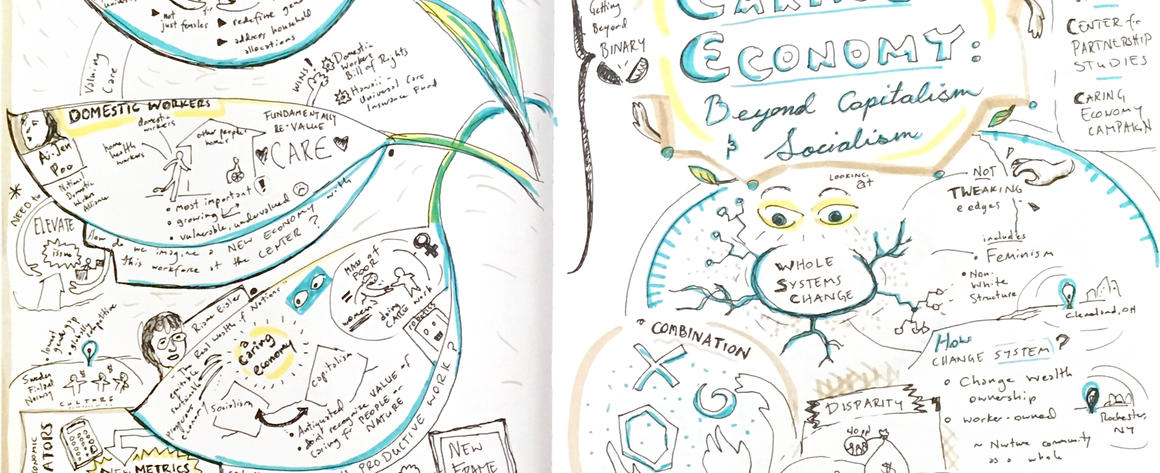Our political-economic system is not working: families are struggling, the middle class is diminishing, one in five U.S. children lives in poverty, we have unacceptably high rates of homelessness and incarceration, rising underemployment, collapsing environmental systems, and a host of other problems. What would it look like if the system in all of its dimensions – cultural, economic, political, environmental – focused on ensuring we have a healthy society and planet? What would it take so caring for people and nature is a top priority? Does the current shift to an age when automation replaces more and more jobs offer an opportunity to build such an economic system? How can we get there, and how can we measure our progress along the way?
In this webinar, our panel of leading thinkers and practitioners weighing in on these questions includes: President of the Center for Partnership Studies and Director of the Caring Economy Campaign, Riane Eisler; Director of the National Domestic Workers Alliance and Co-director of the Caring Across Generations campaign, Ai-jen Poo; Co-Chair of the Next System Project, Gar Alperovitz; and Co-Director of the Global Development and Environment Institute (GDAE) at Tufts University and Core Support proponent, Neva Goodwin. Our partner Laura Flanders of GRITtv moderates the discussion.
More resources
- Bill of Rights campaigns: Compiled by the Domestic Workers’ Alliance in order work to win labor protections for domestic workers by winning domestic worker “Bills of Rights” at the state level, pushing for regulatory changes at the national level, and through the International Labor Organization at the global level. Historically, domestic workers have been left out of the labor protections given to other workers. The Domestic Workers’ Alliance works to right this historic wrong.
- Global Development and Environment Initiative at Tufts University: In our effort to understand actual and possible trajectories of economic development, GDAE researchers emphasize ecological health and the correlation between social and economic well-being. This requires expanding our theoretical understanding of economic systems, recognizing that they are embedded in the physical contexts of technology and the natural world, as well as in the social/psychological contexts of history, politics, ethics, culture, institutions, and human motivations.
- Questions for Candidates- 2016 U.S. Election: This election offers an opportunity to improve the lives of millions of Americans. With growing income inequality, public health crises, reduced state and local budgets, and an economy still recovering from the Great Recession, families are stressed. This guide is tool for bringing vital, yet largely ignored, issues to candidate, media, and public attention, showing the the urgent need for investing in family care and early childhood education — and the enormous economic benefits of doing so.
- Social Wealth Economic Indicators (SWEIs): The conventional assumption has been that a strong economy and caring for people and nature are at odds. SWEIs demolish that assumption. SWEIs show the benefits of investing in care, and the dismal consequences of devaluing it - not only for women (who still do most of the care work), children, the elderly, families, and the natural environment, but also for economic competitiveness.
- Center for Partnership Studies Online Classes: CPS’s online Leadership and Learning Programs bring together women and men from around the world to learn how to become leaders of the partnership and caring economy movements.
- The Center for Partnership Studies is a catalyst for cultural, economic, and personal transformation- from domination to partnership, from control to care, from power-over to empowerment. CPS’s programs provide new knowledge, insights, interventions, and practical tools for this urgently needed shift. We invite you to explore the many resources CPS offers to build a better future for yourself, your family, your community, your nation, and our world.
Our panelists
Neva Goodwin is Co-Director of the Global Development And Environment Institute at Tufts University. She is the lead author of two introductory college-level textbooks: Microeconomics in Context and Macroeconomics in Context, published by M.E. Sharpe. These are the starting points for her endeavor to develop an economic theory— “contextual economics”—that will have more relevance to real-world concerns than does the dominant economic paradigm. The Microeconomics text is available in Italian, Russian, and Vietnamese. Goodwin is also director of a project that has developed a “Social Science Library: Frontier Thinking in Sustainable Development and Human Well-Being.” Containing a bibliography of 10,000 titles, including full text PDFs of about a third of these, this material will be sent on USB drives or CDs to all university libraries in 137 developing countries. As a member of the board of Ceres and in other activities outside of her academic work, Goodwin is involved in efforts to motivate business to recognize social and ecological health as significant, long-term corporate goals. Neva is an emerita member of the board at the New Economy Coalition.
Riane Eisler, JD is President of the Center for Partnership Studies and internationally known as a systems scientist, attorney working for the human rights of women and children, and author of groundbreaking books such as The Chalice and the Blade: Our History, Our Future, now in 26 foreign editions, and The Real Wealth of Nations: Creating a Caring Economics. Dr. Eisler has received many honors, including honorary PhDs and peace and human rights awards. She lectures worldwide, with venues including the United Nations General Assembly, the U.S. Department of State, Congressional briefings, universities, corporations, conference keynotes, and events hosted by heads of State.
Ai-jen Poo is the Director of the National Domestic Workers Alliance and Co-director of the Caring Across Generations campaign. She is a 2014 MacArthur fellow and was named one of Time 100’s world’s most influential people in 2012. She began organizing immigrant women workers nearly two decades ago. In 2000 she co-founded Domestic Workers United, the New York organization that spearheaded the successful passage of the state’s historic Domestic Workers Bill of Rights in 2010. Together with 11 other organizations, DWU launched the National Domestic Workers Alliance in 2007. After noticing an increase in the number of domestic workers originally hired as nannies and housekeepers being asked to provide home care for their employers’ aging relatives, Ai-jen co-led the launch of the Caring Across Generations campaign in 2011 to ensure access to affordable care for the nation’s aging population and access to quality jobs for the caregiving workforce. Ai-jen serves on the Board of Directors of Momsrising, National Jobs with Justice, and Working America. She is a 2013 World Economic Forum Young Global Leader, one of Fortune.com’s World’s 50 Greatest Leaders, and author of The Age of Dignity: Preparing for the Elder Boom in a Changing America. Follow her on Twitter at @aijenpoo.
Gar Alperovitz has had a distinguished career as a historian, political economist, activist, writer, and government official. For fifteen years, he was the Lionel R. Bauman Professor of Political Economy at the University of Maryland, and is a former Fellow of Kings College, Cambridge University; Harvard’s Institute of Politics; the Institute for Policy Studies; and a Guest Scholar at the Brookings Institution.
He is the author of critically acclaimed books on the atomic bomb and atomic diplomacy. As a well known policy expert, he has testified before numerous Congressional committees and lectures widely around the country.
Among his many achievements is having been the architect of the first modern steel industry attempt at worker ownership in Youngstown, Ohio. In addition, he was nominated to be a member of the Council of Economic Advisers by leading national consumer, labor, and environmental organizations.
Laura Flanders is a best-selling author and broadcaster. After many years in public and commercial radio, she founded The Laura Flanders Show / GRITtv in 2008 to serve as an online channel for in depth conversations with forward-thinking people fromt he worlds of politics, economics, business and the arts. A primetime, daily broadcast, GRITtv with Laura Flanders aired for three years on Free Speech TV before moving to KCET/Linktv and teleSUR, as a weekly program. Flanders is a contributing writer to The Nation and Yes! magazine (“”). She is also the author of six books including the New York Times best-seller, BUSHWOMEN: Tales of a Cynical Species (Verso, 2004) and Blue GRIT: True Democrats Take Back Politics from the Politicians (Penguin Press, 2007). The Laura Flanders Show aired nationally on Air America Radio (2004-2008) before which she was the founding host of Your Call, on public radio, KALW, and CounterSpin, the nationally-syndicated radio program from the mediawatch group FAIR. Flanders is a repeat guest on Real Time with Bill Maher and appears regularly on MSNBC. She’s also served as a substitute host for PBS veteran, Bill Moyers.



